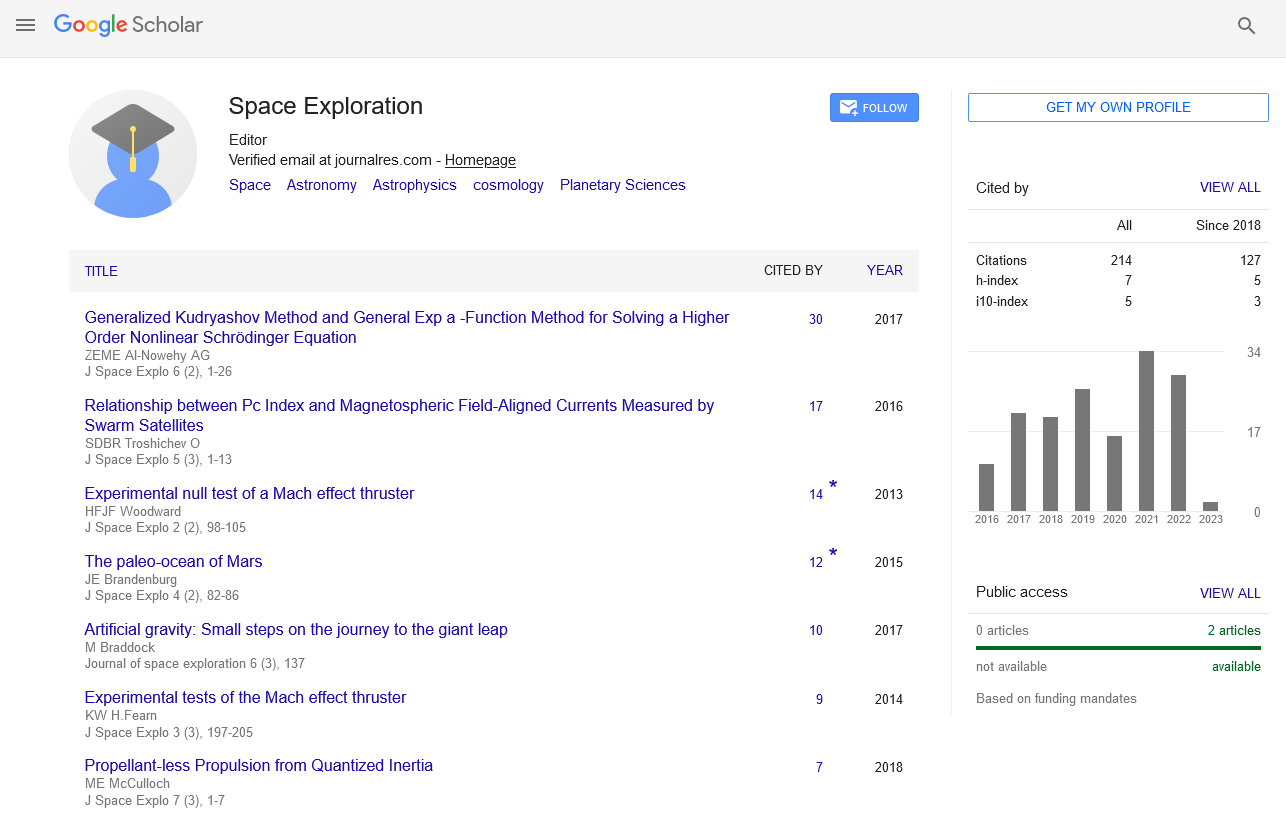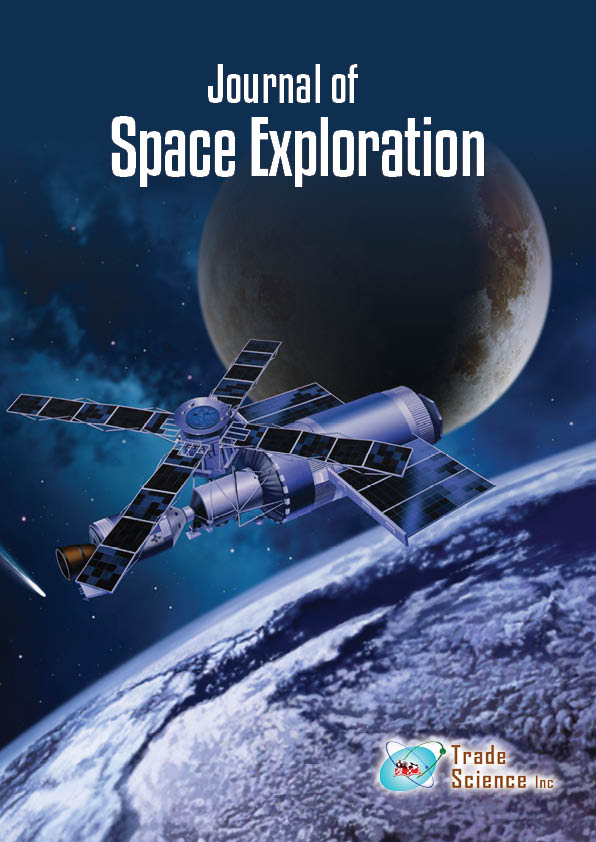Short communication
, Volume: 9( 1) DOI: 10.37532/2319-9814.2020.9(1).161Cognitive Training as a Countermeasure for Cognitive Changes During a Space Mission
- *Correspondence:
- Nicola Mammarella
Department of Psychological Sciences, Health and Territory, Via deiVestini 31 University of Chieti, Italy
E-Mail: n.mammarella@unich.it
Received: March 13, 2020; Accepted: March 17, 2020; Published: March 25, 2020
Citation: Mammarella N, Gatti M. Cognitive Training as a Countermeasure for Cognitive Changes During a Space Mission. J Space Explor. 2020;9(1):161.
Abstract
Among the psychological countermeasures developed to reduce the effects of a space flight on astronauts’ performance, cognitive training is the most promising. The aim of this short communication is to provide an overview of the current evidence on the use of cognitive training in space research, and evaluate its potential benefits. The few available findings coming from Earth-based simulations and space flights highlight that cognition-based countermeasures led to greater performance benefits when compared with control conditions. Although further studies are needed to evaluate the general impact of cognitive training on astronauts’ performance (e.g., short-term and long-term transfer effects), the use of cognitive interventions should be warranted in future space missions.
Keywords
Cognitive training; Brain-derived neurotrophic factor; Sensorimotor skill; Visual processing
Introduction
Cognitive training is a widespread technique for enhancing mental functioning. It is based on the assumption that engaging in a series of cognitive activities over time positively affects the central nervous system and, consequently, it allows compensation and/or enhancement of cognitive skills. There is still a debate about the duration of the effects of a cognitive training and its generalization to untrained behavior [1]. The pattern of data is often confused due to methodological differences across studies in terms of type, frequency and duration of the training program. However, the usefulness of cognitive interventions for improving cognition and maintaining cognitive skills is well-established even in space research. Psychological literature typically identifies two major categories of interventions. The first type of training is strategy-based, i.e. based on a specific technique to support execution of a cognitive task (for example, mnemonic strategies for memory tasks) or on multi-domain techniques, that is, programs that involve multiple cognitive domains, such as perception, attention, memory, etc. (as in the case of video games-based programs). The second type of training is process-based, that is, interventions based on general processing skills (e.g., speed of processing) which, therefore, support a variety of cognitive functions. As far as we know, we do not have yet studies that clearly compared the effects of these two types of interventions during a space mission.
One of the first works on cognitive training in the space context is the one by Eddy et al. [2]. Four astronauts took part in 37 training sessions: 24 before, 9 during and 4 at the end of the mission. The 24 sessions before departure included 8 training sessions for two days and 16 practice sessions for about 3 weeks. Cognitive testing lasted about 20 min. and participants were engaged in a spatial matrix rotation task, a continuous recognition test, Stenberg's memory task, math tests, and divided attention tasks. In general, cognitive performance did not show marked changes during the mission, although there were fluctuations in mathematical and spatial rotation abilities. However, it has to be noticed that the study was developed with the primary aim of gathering some first evidence about the possibility of measuring cognitive functions in orbit. More interesting work is the one by Marusic and colleagues [3]. The authors assessed the effect of cognitive training in a 14-day head-down bed resting condition by measuring brain activity via EEG. The experimental group performed a series of virtual space navigation tasks, while the control group watched a series of documentaries. Cognitive training was effective in buffering the effects of the head down bed rest period on the brain. The experimental group showed a power decrease in low delta and theta waves, while an increase in the same bands occurred in the control group. Given that an increase in delta and theta waves is typically observed in cognitive aging, the authors concluded that these findings can be considered an index of the cognitive training’s benefits.
Another similar study [4] focused on the effects of the head down bed rest condition on the Brain-Derived Neurotrophic Factor (BDNF), a protein that supports neuronal growth. Usually, an increase in the BDNF is observed in aging and indexes a series of protective mechanisms against cognitive changes. Following cognitive training, the authors did not find an increase in the neurotrophic factor after the resting period, highlighting how cognitive interventions may reduce the negative effects of head-down bed rest.
A different study is the one by Bloomberg et al. [5] who developed a specific program to train sensorimotor skills (the so-called sensorimotor adaptation training). In particular, participants walked on a treadmill mounted on mobile support. This training system allows us to stimulate simultaneously visual processing (for instance, with the use of discordant visual information) and motor skills (e.g., walking on mobile support). The final aim was to train the ability to keep the posture in balance and gait stability. Although the authors did not test this sensorimotor training with astronauts, it represents an interesting attempt to develop new training programs that rely on cross-modal processing.
The first intervention that we can strictly define as cognitive can be traced in a work that focused on the role of imagery during a simulated space flight [6]. Participants had to cope with a series of emergencies after taking part in three imaginary training sessions. These sessions were supervised by an instructor or were self-guided. The imagination sessions involved the use of mental images that brought attention to visual, auditory, tactile and olfactory sensations. The authors recorded Heart Rate Variability (HRV), as a measure of the autonomic nervous system and individual regulatory capacities. It was found that only participants who engaged in the training sessions showed an increase in HRV, which is typically associated with relaxation and positive emotions.
In conclusion, there are not many published data on the effectiveness of cognitive training programs in space research. Unfortunately, the definition of a training per sé requires being tested with multiple tasks and during multiple sessions. Consequently, training programs are not easy to be implemented on board of the International Space Station. The majority of findings stems, in fact, from Earth-based simulation studies. It is also true that the numerous behavioral experiments that astronauts are invited to carry out on the ISS, can be considered instances of cognitive training. At this stage we are not able yet to measure the effectiveness of different cognitive trainings during a space mission and evaluate their benefits in the short- and long-term run. We hope that future studies will adopt the distinction between strategy-based and process-based training and/or foster the development of new research paradigms and guidelines about the use of cognition-based countermeasures during a space mission.
References
- Nguyen L, Murphy K, Andrews G. Cognitive and neural plasticity in old age: A systematic review of evidence from executive functions cognitive training. Ageing Research Reviews. 2019;30:100912.
- Eddy DR, Schiflett SG, Schlegel RE, et al. Cognitive performance aboard the life and microgravity Spacelab. ActaAstronautica. 1998;43(3-6):193-210.
- Marusic U, Meeusen R, De Pauw K, et al. Cognitive training diminishes negative effects of simulated microgravity during bed rest on brain electro-cortical activity. Med Sci Sports Exerc. 2014;46(5S):281.
- Passaro A, Soavi C, Marusic U, et al. Computerized cognitive training and brain-derived neurotrophic factor during bed rest: mechanisms to protect the individual during acute stress. Aging (Albany NY). 2017;9(2):393.
- Bloomberg JJ, Peters BT, Cohen HS, et al. Enhancing astronaut performance using sensorimotor adaptability training. Front Syst Neurosci. 2015;9:129.
- Yijing Z, Xiaoping D, Fang L, et al. The effects of guided imagery on heart rate variability in simulated spaceflight emergency tasks performers. Biomed Res Int Biomed Res Int. 2015.

